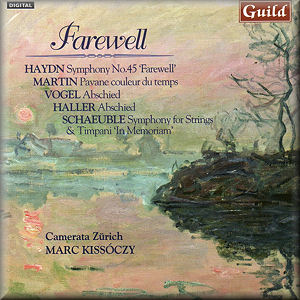 |
 |
|


alternatively
Download: AmazonUK |
Farewell
Franz Joseph HAYDN (1732 – 1809)
Symphony No.45 in F# minor, Farewell (1772) [24:31]
Frank MARTIN (1890 – 1974)
Pavane couleur du temps (1920) [6:56]
Wladimir VOGEL (1896 – 1984)
Abschied (1973) [7:54]
Herman HALLER (1914 – 2002)
Abschied, op.59 (1973?) [13:23]
Hans SCHAEUBLE (1906 – 1988)
Symphony, In memoriam, op.27a (1943/1944 – 1977) [18:12]
 Barbara Böhl (soprano)
Barbara Böhl (soprano)
Camerata Zürich/Marc Kissóczy
rec. 31 March 2008 (Haydn), 30 August 2008 (Haller, Martin and Vogel),
29 September 2009 (Schaeuble), Radiostudio Zürich. DDD
 GUILD GMCD7342 [71:20]
GUILD GMCD7342 [71:20] 
|
|
|
I am sure that because of Mahler’s naming of the final movement
of Das Lied von der Erde, Abschied, that word has come
to mean, for many music lovers, death and the end of just about
everything, as it does in that work; this despite the eternal
renewing epilogue of the music. But Abschied is an innocent
little word merely meaning farewell, and not in any terminal
sense. Take Haydn’s Symphony of that name. His idea was a joke,
to bring to the attention of his patron that the musicians deserved,
and needed, a holiday. That it’s one of his Sturm und Drang
period works doesn’t make it any the darker or more deeply felt,
in an emotional sense. Haydn’s ruse worked and the well deserved
holiday was granted. Kissóczy directs a passionate and fiery
account of this music, very well conceived for the piece, and
the ending, where the players drop out one by one, as if leaving,
is nicely delivered. This is as finely considered a performance
of this work as I have heard.
Frank Martin’s Pavane couleur du temps - it seems impossible
viably to render it into English, the translation Colour
of the Weather Pavane seems ludicrous, what did he have
in mind at the time of composition, one wonders - is a slow
movement with an air of solemnity and nobility. Quite what it
has to do with the concept of farewell is beyond me, perhaps
his use of the title Pavane evoked, for someone, memories
of Ravel’s Pavane pour une infante defunte and thus it
seemed to fit into a collection of Farewells. It’s a fine piece,
but there’s nothing of a departure about it, and the strangely
equivocal ending is mystifying. Wladimir Vogel’s Abschied
is more the kind of thing I would have expected here. This is
an atmospheric and sustained lament, beautifully laid out for
strings alone. Herman Haller’s similarly titled work is a setting
of words by Juan Ramón Jiménez in a translation by Hans Leopold
Davi, whose first half is a protest for the strings alone. On
the entry of the voice, the music becomes calmer and more lyrical.
Throughout there’s some nicely contrasted writing for solo and
massed strings but I have to say that the piece outstays its
welcome, for there is too little material to sustain nearly
a quarter of an hour’s music. Barbara Böhl’s singing is very
fine, with a good line and a sensitive and intelligent use of
vibrato.
I first encountered the music of Hans Schaeuble when I reviewed
a CD devoted to archive recordings of his music (GUILD 2332)
and I was impressed. This Symphony was written in 1943/1944,
for strings, and then reworked and incorporated into his 2nd
Symphony, as the 3rd and 4th movements.
Thirty-three years later he returned to the original score and
added a part for timpani, and this is the version we have here.
Dedicated to “my Berlin friend and promoter Oswald Schrenk”
the music is deeply felt, and, oddly, at times, has an English
feel. It’s a beautifully written score and one is left wondering
why it’s seldom, if ever, heard.
This is a fascinating collection, played with style and grace,
and recorded in excellent sound, with a feeling of space, the
orchestra being placed slightly away from the microphones. The
booklet contains, different, notes in English, by Robert Matthew
Walker and German, by Guy Andrea Lang. I can heartily commend
this to anyone, not just those interested in music of the period,
nor those seeking unusual repertoire, for this is music which
deserves to be heard.
Bob Briggs
|
|















